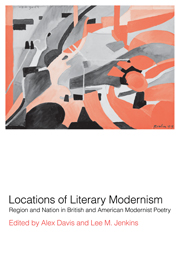Book contents
- Frontmatter
- Contents
- Notes on contributors
- Preface
- INTRODUCTION
- PART ONE OBSTINATE ISLES: THE ANGLO-CELTIC ARCHIPELAGO
- PART TWO AN AMERICAN PLACE
- 7 Pound's places
- 8 Wallace Stevens and America
- 9 Locating the lyric: Marianne Moore, Elizabeth Bishop and the Second World War
- 10 ‘In the published city’: the New York School of Poets
- 11 Modernism deferred: Langston Hughes, Harlem and jazz montage
- Notes
- Index
11 - Modernism deferred: Langston Hughes, Harlem and jazz montage
Published online by Cambridge University Press: 06 July 2010
- Frontmatter
- Contents
- Notes on contributors
- Preface
- INTRODUCTION
- PART ONE OBSTINATE ISLES: THE ANGLO-CELTIC ARCHIPELAGO
- PART TWO AN AMERICAN PLACE
- 7 Pound's places
- 8 Wallace Stevens and America
- 9 Locating the lyric: Marianne Moore, Elizabeth Bishop and the Second World War
- 10 ‘In the published city’: the New York School of Poets
- 11 Modernism deferred: Langston Hughes, Harlem and jazz montage
- Notes
- Index
Summary
On 15 January 1926, Langston Hughes read first at the Washington Playhouse, then in Baltimore, and at the end of the month at a venue in Claremont Avenue near Columbia University in New York from his newly published first volume of poetry, The Weary Blues. The volume was published by Alfred A. Knopf in a striking red, black and yellow wrapper. It carried a drawing of an angular blues pianist on its front by the Mexican caricaturist Miguel Covarrubias and an introduction by the white author, Harlem impresario, friend to Hughes and others of the ‘Negro Renaissance’, Carl Van Vechten. Vechten had been instrumental in securing the publication of Hughes' book with Knopf and had hosted a party in Hughes' honour in November 1925. His own controversial novel Nigger Heaven was also to appear later in 1926.
The reading in Washington was presided over by Alain Locke, Professor of Philosophy at Howard University in Washington and editor the previous year of the special issue of the Survey Graphic on black arts and culture and of the celebrated collection The New Negro: An Interpretation based upon it. This had announced the arrival of a ‘new group psychology’ and ‘collective effort, in race co–operation’ and a social project led by ‘the more advanced and representative classes’ to reclaim the inspiration and advantages of American democracy. ‘The Negro mind’, wrote Locke, ‘reaches out as yet to nothing but American wants, American ideals.’
- Type
- Chapter
- Information
- Locations of Literary ModernismRegion and Nation in British and American Modernist Poetry, pp. 231 - 247Publisher: Cambridge University PressPrint publication year: 2000
- 2
- Cited by



